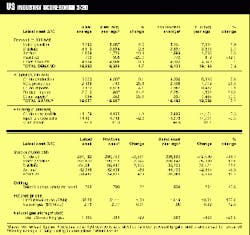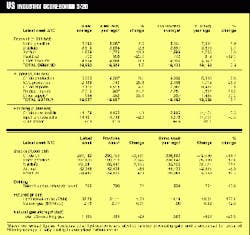OGJ Newsletter
What may be the biggest sale of E&P assets ever will also drastically alter the landscape in one of North America's most critical petroleum provinces while clearing the way for one of history's biggest mergers.
In a move that will nearly double its reserves, Phillips Petroleum has agreed to buy all of ARCO's Alaskan assets for $6.5 billion cash, plus up to $500 million more based on future crude oil prices.
As a result, the US Federal Trade Commission immediately postponed indefinitely any legal action blocking the merger of BP Amoco and ARCO. "In light of the substantial and constructive proposals made by the defendants, all parties have agreed to seek adjournment of the federal court proceedings," said Richard Parker, director of FTC's Bureau of Competition.
The FTC and the states of Washington, Oregon, and California had opposed the merger for fear that BP Amoco would dominate the US West Coast oil market-and thus exert undue influence over West Coast gasoline prices. Sale of ARCO's Alaskan holdings is expected to close in early April, pending approval by those federal and state officials.
Meantime, Alaska has already signed an amended charter with Phillips, reconfirming BP Amoco's and ARCO's commitments to the state in order to earn its approval of the merger.
While the deal dramatically increases Phillips's size, it also greatly enlarges the firm's debt load, leading to the major credit rating agencies placing the company's debt rating on review for possible downgrade.
OPEC's meeting next week could be a "nasty one," says Canadian Energy Research Institute. CERI did, however, commend both Saudi Oil Minister A* al-Naimi and US Energy Sec. Bill Richardson for their efforts to "[break] OPEC intransigence towards higher production quotas come April.
"High oil prices and the SPR threat have forced a mass exodus from OPEC's 'quota rollover' camp, with Iran, the arch-price hawk, bailing out this week," CERI said, "with only two relatively inconsequential OPEC members-Libya and Algeria-continuing to support the rollover, an agreement to boost quotas [Mar. 27] is a fait accompli."
President Clinton has extended a 1995 executive order that bars US oil companies from entering into oil development deals with Iran.
Clinton said, "The actions and policies of the government of Iran continue to threaten the national security, foreign policy, and economy of the US."
Meanwhile, Chinese and Swiss firms have reportedly signed a $103 million deal with Tehran to construct an oil pipeline that would effectively establish the country as a vital export transit for Caspian crude. Oil would flow from Neka to Tehran. China National Petroleum Corp. and Sinopec are thought to be holding talks with Iran, and Swiss trading house Vitol was reported as saying it soon will close on a financing deal for a $400 million pipeline.
That situation underscores comments made by Halliburton Chairman Dick Cheney and US Export-Import Bank Chairman James Harmon at a press roundtable in Houston last week. "Unilateral sanctions are almost always a mistake," Cheney said, noting, "There is a great deal of activity under way in Iran-(but) the only companies that can't work there are American companies."
Harmon concurred, adding that US sanctions make it difficult for the US Ex-Im Bank to function credibly in many countries and more difficult for the US to compete with other countries that have comparable lending agencies. Harmon cited the situation during the brief period of US sanctions targeting India when that nation disclosed plans for nuclear weapons tests, noting that, today, European firms are doing four times the business in India that US firms are.
A dispute over gas-fired power plants-and, by proxy, over climate change concerns-has brought down Norway's government.
Prime Minister Kjell Magne Bondevik resigned last week after losing a vote of confidence in Parliament over easing pollution laws to allow construction of gas-fired power plants. A new government coalition is expected to be headed by Labor party leader Jens Stoltenberg, although there is likely to be little change in oil policy for the world's second-biggest oil exporter.
The crux of the dispute is that a parliamentary coalition, egged on by environmentalist groups, wants to postpone building gas-fired power plants until technology can be developed to greatly reduce their CO2 emissions, presumed to contribute to purported catastrophic climate change. Stoltenberg and Labor favor the gas-fired plants, claiming that Norway's growing power demand has forced it to import coal-based power to supplement its hydro-based power.
Egypt's plans to export gas to the eastern Mediterranean countries of the Middle East have stumbled, thanks to the discovery of apparent world-class gas fields off Israel's coast (see Industry Briefs, p. 32).
Israel has frozen contacts with Egypt over a proposal to export gas from prolific finds off Egypt's Mediterranean coast to Israel, the Palestine territories, and eventually Lebanon, Syria, and possibly Turkey. Talks are suspended until the scope and commerciality of the Israe* finds can be ascertained.
Despite currently robust world LPG prices, sobering analyses of the gas processing business greeted attendees at last week's Gas Processors Association convention in Atlanta. Consolidation in US midstream processing will continue, even accelerate, in the short to medium term, says Dynegy Midstream Services CEO and Pres. Steve Furbacher. It will continue "until we have two to four major North American competitors and a series of smaller niche or regional processors. The result will be two, possibly three competitors in each major [producing] basin" and perhaps as few as one or two "if the remaining businesses are to make the kind of financial returns demanded by today's investors and stock analysts." This consolidation will only be aggravated by a continued squeeze on NGL prices by increased US imports, he said.
Looking outside the US, Purvin & Gertz's Craig Whitely sees a crisis looming later this decade for LPG supplies to resurgent Asian economies. Double-digit demand growth in China alone by 2010 will reach 16.3 million tonnes/year.
Coupled with Japanese LPG demand pegged at 15 million tonnes/year, the total will almost equal the expected 31 million tonne/year output capacity in 2010 in the Middle East-Asia's key LPG supplier. Complicating this supply tightness, says Whitley, is growth in Saudi petrochemical sector demand.
The Ukraine government plans to end the state petroleum company's monopoly in gas purchases, transportation, and sales. The government is working on a new gas market concept, Deputy Prime Minister Yulia Timoshenko said last week. The right to trade gas with all users in a region will be awarded in a tender; participants will have to produce property guarantees. Municipal and regional gas transporting agencies as well as commercial companies will be allowed to take part. Timoshenko says gas transportation will also be unbundled from sales and that if a company providing gas fails to collect fees, it will lose the right to sell gas in the particular region and, if necessary, be held accountable with its property. She cites as one reason for demonopolization the inability of the state petroleum firm to organize an effective system of gas supplies and collecting fees for delivered gas. A working group bringing together officials of city and regional gas transporting agencies will draft the concept.
US producers want FERC to reconsider Order 637, issued last month to update gas transportation rules (OGJ, Feb. 21, 2000, p. 24). Both IPAA and NGSA praised several aspects of the order but say it still falls short.
NGSA commended the order for creating greater transparency, for not lifting rate caps on primary capacity, and for not providing negotiated terms and conditions. However, NGSA wants FERC to reconsider its ruling on lifting the price cap on short-term capacity and the allowance of pipelines to change seasonal rates without a rate review. It also complained the rule allows pipelines to keep up to 50% of overcollections, rather than returning payments to shippers.
Following a suit, INGAA, representing gas pipelines, urged FERC to implement the rule quickly but asked for several clarifications.
Land access will be one of the biggest hurdles for industry to surmount in meeting the increasing demand for natural gas, said NGSA Chairman Dick Sharples (see Editorial, p. 17). "Access to natural gas is really gas to [fuel] clean electricity," he told reporters in Houston last week.
Sharples says that, because 2000 is an election year, he doesn't expect much to be done on Capitol Hill regarding many gas-related issues but that land access will be among the top issues for the future.

